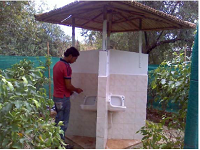Treatment and Purification
Chromium contaminates Bangalores drinking water
Posted on 22 Nov, 2014 10:30 AMChromium afflicts borewells in India's largest industrial area
A green house like no other
Posted on 22 Nov, 2014 10:30 AM“I want to live in a house like this!” was my first thought when I entered Vishwanath’s home. (Vishwanath is Founder, Director of Biome Solutions). My colleague and I had gone to visit his house to see and understand how he has implemented ranwater harvesting systems and other green initiatives there.
Fight waterborne diseases before they happen
Posted on 22 Nov, 2014 10:30 AMThe monsoon brings with it water-borne diseases like diarrhoea, cholera and dysentery, which cause suffering and death. Although this is a recurring theme annually, not enough measures are taken to prevent this. The state of Assam decided to take some action in May of this year.
Delhis ground water hits rock bottom
Posted on 22 Nov, 2014 10:30 AMGreen pastures and meadows, tall trees, lakes, wells and the river…those are my memories of Delhi. It wasn’t too long ago that one woke up early to the sounds of lawns being watered, children running off to school and people walking in the parks. A flurry of activity but quite different from what it is today.
Alternative and sustainable drinking water and sanitation security in flood prone areas of north Bihar: Report on the groundwater seminar organised by Megh Pyne Abhiyan and ACWADAM 2011
Posted on 22 Nov, 2014 10:30 AMThe report is divided into the following sections:
Conference report: The Anil Agarwal Dialogue on Excreta does matter organised by Centre for Science and Environment on 45 March 2013 at New Delhi
Posted on 22 Nov, 2014 10:30 AMA close examination of these two issues shows that the water and sewage challenge is already grave and could get worse. With this as the backdrop, Centre for Science and Environment (CSE), a public interest research and advocacy organisation based in New Delhi, organised a two day conference called the Anil Agarwal Dialogue on “Excreta does matter”. The conference took place at the Jacaranda Hall, India Habitat Centre, Lodhi Road, New Delhi on 4 and 5 March 2013.
The dialogue aimed at furthering the agenda of CSE’s seventh State of India’s Environment report titled Excreta Matters. This report is a comprehensive survey of the situation of water and wastewater management in 71 Indian cities. The study found that most cities lack a basic policy direction on how best to tackle issues of demand, supply and treatment of water, and of management of sewage.
The Dialogue being the first of its kind brought together a wide range of professionals, activists, practitioners, policy makers, academicians, researchers and administrators from the water sector. The event was aimed at drawing attention on the critical issues of how cities will get affordable and sustainable water and waste systems that can supply to all and take back and treat the sewage of all.

How have Indias flagship development programmes fared Budget briefs on the TSC JNNURM and MGNREGS by the Accountability Initiative
Posted on 22 Nov, 2014 10:30 AMGovernment of India’s development programmes are aimed to bring in much required inclusive development and pave a way towards an equitable and socially just society. With this motive the Centre had introduced several programmes in social sectors and allocated a fixed amount for achieving the set goals.
An analysis on the performance of the programmes shows how far the targets have been achieved, the shortcomings and the steps that are to be taken to strengthen the programmes.

Toilets in the making: Delhi Urban Art Commission DUAC designs eco friendly and low cost public toilets for Delhi
Posted on 22 Nov, 2014 10:30 AM

Strategies for achieving environmental sustainability in rural development A report by United Nations Development Programme
Posted on 22 Nov, 2014 10:30 AMThis report by the United Nations Development Programme (UNDP) presents strategies for inclusive rural development embodying the principles of environmental sustainability. It recommends measures needed to achieve green, including measuring and tracking, the use incentives and the building of capacities. It also contains a number of case studies showing how green results can be achieved.
A resource book on waterless urinals: an ecological sanitation method that saves water energy and uses urine as a resource
Posted on 22 Nov, 2014 10:30 AM
Waterless urinals (WLU) save water, energy and use urine as resource ( Image courtesy: R Sakthivel)





